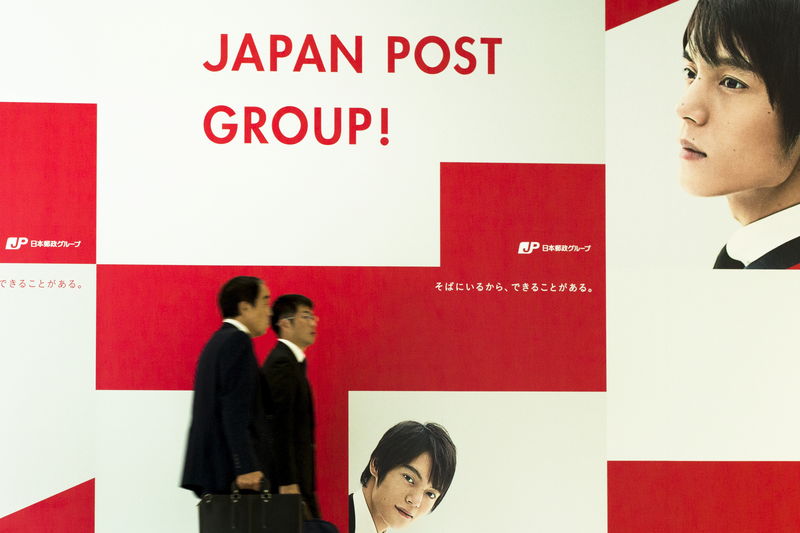By Takaya Yamaguchi
TOKYO (Reuters) - Japan's $2.6 trillion (2 trillion pounds) regional banking industry faces more pressure to consolidate under a government proposal to free one of its biggest rivals, state-controlled Japan Post Bank, to compete harder for deposits.
The government is considering raising the deposit limit at the newly listed Japan Post Bank Co (T:7182) by up to half, people involved in the process said, a move fiercely opposed by private-sector banks who fear the $1.5 trillion giant will suck deposit money out of smaller lenders.
Prime Minister Shinzo Abe's policymakers are also considering a modest rise in the maximum value of life-insurance policies sold by Japan Post Insurance Co (T:7181), the government and ruling party sources told Reuters.
The changes could be in place by March, they said.
"In a way, I feel the move is more pressure by the government on us regional banks to consolidate," said a senior executive at a regional bank.
Relaxing deposit curbs won't immediately affect smaller lenders, "but in the longer term, it could have an impact when overall deposit money starts to decline, especially in rural areas," said Ryoji Yoshizawa, director at Standard & Poor's Ratings Japan.
Japan Post's two financial units debuted on Tokyo's stock market last week. The government raised $12 billion selling stakes in the pair and their parent Japan Post Holdings Co (T:6178) in the world's biggest public offering of the year and Japan's biggest privatisation in three decades.
The institutions remain politically sensitive because even after the triple-IPO, the government holds 90 percent of Japan Post Holdings, which in turn runs the postal system and retains 90 percent of the bank and insurance units.
A Japan Post Holdings spokesman declined to comment.
PRIVATE-SECTOR BANKS' FEARS
The proposal to raise the 10 million yen ($81,000) deposit ceiling, in place for 24 years, by 3-5 million yen could hurt private-sector banks, who fear Japan Post Bank will increase what they see as an already unfair advantage.
Private-sector banks have no caps but their deposits are insured only up to 10 million yen.
Japan Post Bank is made to operate under a deposit cap to placate its private-sector competitors, who claim it has an advantage over them as people believe its deposits carry an implicit government guarantee. The bank is also barred from most forms of commercial lending.
Japan Post Holdings CEO Taizo Nishimuro has said the bank wants a freer hand to enter new businesses in the coming years as the government sells down its stake.
With 178 trillion yen in deposits, the bank is on par with Japan's three "megabanks" and offers financial services at 24,000 post offices scattered across a country the size of California.
Japan Post Holdings and Japan Post Bank shares added to gains in Tuesday afternoon trading after Reuters reported the deposit proposal, each ending about 3 percent higher. Regional bank shares were roughly in line with the 0.2 percent gain in the Nikkei Stock Average (N225).
Regional banks worry that not only would a higher deposit threshold lure money to Japan Post Bank, it could usher in further deregulation even while the government keeps its majority hold.
Sources told Reuters in September than one unstated aim of the Japan Post IPO was to add pressure on regional banks to consolidate.
Financial regulators have been quietly trying - with little success - to get the more than 100 local lenders, with deposits totalling 317 trillion yen, to merge or tie up as the population outside the biggest cities shrinks and lending stagnates.
Postmasters, who had wanted the deposit limit scrapped, are often influential figures in local communities, and can get out the vote for Abe's Liberal Democratic Party. They lobby on behalf of the institution, which would benefit from the increased transaction base if deposits increase.
Abe's government wants to please the postmasters ahead of parliamentary elections next summer, the sources said. But it is balancing their wishes against those of the banking industry and the Financial Services Agency, which fears any sudden disruption to the industry.
